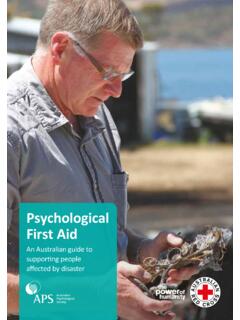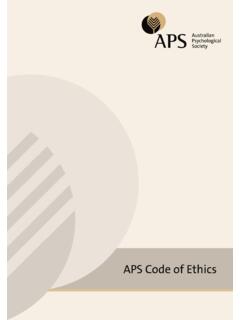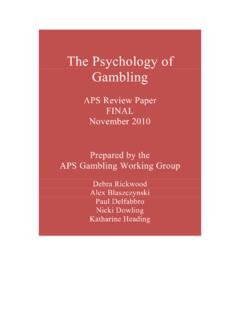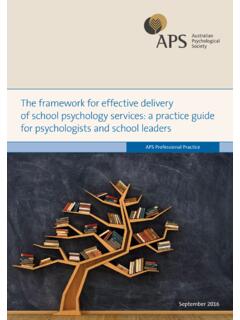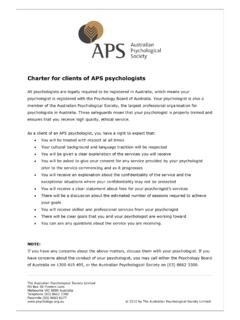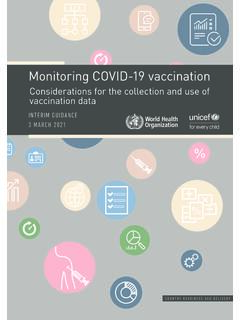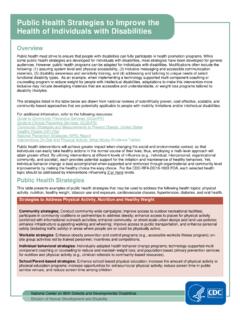Transcription of Evidence-based Psychological Interventions FOURTH EDITION
1 1 Evidence-based Psychological InterventionsFOURTH EDITIONACKNOWLEDGEMENTSThis review has been produced by the Australian Psychological Society (APS) with funding from the Australian Government Department of Health. The APS project team comprised:Mr Harry Lovelock Ms Marguerite HoneDr Rebecca Mathews Mr Adam VujicDr Louise Roufeil Ms Laura SciacchitanoMr Fletcher Curnow Ms Selena MeneghiniList of reviewersAssoc Prof Rocco Crino Mr Tony McHughDr Mandy Deeks Prof Greg MurrayDr John Farhall Dr Lyn O GradyMr Stephen Hirneth Assoc Prof Amanda RichdaleDr Catherine Hynes Dr Susette SowdenDr Moira Junge Dr Caroline StevensonAssoc Prof Nikolaos Kazantzis Prof John ToumbourouAssoc Prof Chris Lee Prof Tracey WadeMs Tracy MacFarlane Dr Simon WilkschProf Marita McCabe Dr Hollie Wilson Prof Peter McEvoy Input was also sought from the following key stakeholders.
2 Australian Association of Social Workers (AASW) Occupational Therapy Australia (OTA) Royal Australian College of General Practitioners (RACGP) Royal Australian and New Zealand College of Psychiatrists (RANZCP)DISCLAIMER AND COPYRIGHTThis publication was produced by The Australian Psychological Society Limited (APS) as a resource to guide the provision of services to people with mental disorders. The information provided does not and cannot replace clinical judgment and decision making. Although every reasonable effort has been made to ensure the accuracy of the information, no guarantee can be given that the information is free from error or omission. The APS, its officers, employees, and agents will accept no liability for any act or omission occurring from reliance on the information provided, or for the consequences of any such act or omission.
3 The APS does not accept any liability for any injury, loss, or damage incurred by use of or reliance on information in this document. Such damages include, without limitation, damages that might be regarded as direct, indirect, special, incidental, or consequential. Any reproduction of this material must acknowledge the APS as the source of selected passage(s), extract(s), or other information or material reproduced. For reproduction or publication beyond that permitted by the Copyright Act 1968 (Cth), permission should be sought in 2018 The Australian Psychological Society 4 REVIEW OF THE RESEARCH LITERATURE 5 ESTABLISHING AN EVIDENCE BASE 11 METHODOLOGY 13 PRESENTATION OF THE LITERATURE 15 SUMMARY TABLE: ADULTS 16 SUMMARY TABLE: CHILDREN AND ADOLESCENTS 17 MENTAL DISORDERS: ADULTS 19 MENTAL DISORDERS.
4 CHILDREN & ADOLESCENTS 125 Table of Contents4 Evidence-based Psychological InterventionsFOURTH EDITIONA bbreviationsABBT Acceptance-based behaviour therapyACT Acceptance and commitment therapyADHD Attention deficit hyperactivity disorderBDD Body dysmorphic disorderBED Binge eating disorderBMI Body mass indexBPD Borderline personality disorderC AT Cognitive analytic therapyCBGT Cognitive behavioural group therapyCBT Cognitive behaviour therapyCRT Cognitive remediation therapyDBT Dialectical behaviour therapyDDP Dynamic deconstructive psychotherapyDSM Diagnostic and Statistical Manual of Mental DisordersEDNOS Eating disorder not otherwise specifiedEFT Emotion-focused therapyEMDR Eye movement desensitisation and reprocessingERP Exposure response preventionFI Family interventionFPT Focal psychodynamic therapyGAD Generalised anxiety disorderICD International Classification of DiseasesIPSRT Interpersonal and social rhythm therapyIPT Interpersonal therapyIUT Intolerance of uncertainty therapyMAGT Mindfulness and acceptance based group therapyMANTRA Maudsley Anorexia Nervosa Treatment for AdultsMBCT Mindfulness-based cognitive therapyMBRP Mindfulness-based relapse preventionMBSR Mindfulness-based stress reductionMCT Metacognitive therapyMDFT Multidimensional family therapyMET Motivational enhancement therapyMFGP Multifamily group psychoeducationMI Motivational interviewingMST Multisystemic family-focused
5 TherapyNOS Not otherwise specifiedOCD Obsessive compulsive disorderPCT-A Panic control treatment for adolescentsPHN Primary Health NetworksPST Problem-solving therapyPTSD Posttraumatic stress disorderRCT Randomised controlled/clinical trialSAD Social anxiety disorderSFBT Solution-focused brief therapySFT Solution-focused therapySSRI Selective serotonin reuptake inhibitorsTA U Treatment as usual5 Review of the Research LiteratureBACKGROUNDThis document is a systematic review undertaken to update the APS document Evidence-based Psychological Interventions in the Treatment of Mental Disorders: A Literature Review (3rd EDITION ). This review was first conducted in 2003 in the context of the Australian government s Better Outcomes in Mental Health care initiative.
6 It was updated in 2006 and again in 2010 with consideration of the introduction of primary healthcare services through the Access to Allied Psychological Services (ATAPS) and Better Outcomes to Mental Health care initiative. The current update takes into account the 2016 Australian government changes to the delivery of primary mental health care services in Australia that aim to make mental health services more accessible and to target groups in the community that are most in need. The latest changes have included major developments that impact on the structure and approaches used in the provision of mental health services, including the establishment of primary health networks (PHNs), replacing Medicare locals as the local coordinating healthcare organisations, along with a suite of mental-health reforms.
7 These reforms include undertaking regional needs assessment and tailoring services to local needs, delivering services within a stepped care approach, making optimal use of digital mental health services, and targeting priority groups such as Aboriginal and Torres Strait Islander people, children and youth, and clinical care coordination for severe and complex mental PURPOSE AND LIMITATIONS OF THE REVIEWT here is now sufficient evidence to demonstrate that Psychological Interventions are both effective and cost-effective in the treatment of mental disorders and that these Interventions contribute more broadly to the community and the economy through a reduction in need for access to health services generally and increased functioning and This review is intended to provide the latest evidence about a range of Psychological Interventions for the treatment of mental disorders to assist in decision making about optimal mental health treatment.
8 This should support the work of the PHNs as well as mental health professionals providing Psychological Interventions under Better Access and other government-funded mental health initiatives. Information is provided as part of a narrative review with an expert synthesis of the research findings and conclusions, including identification of key limitations. The review does not contain a comprehensive critique of the research undertaken, and readers seeking a detailed understanding of the research methodology and findings should access the source articles. DISORDERS INCLUDED IN REVIEW3 Mood disorders Depression Bipolar disorderAnxiety disorders Generalised anxiety disorder Panic disorder Specific phobia Social anxiety disorder Obsessive compulsive disorder Posttraumatic stress disorderSubstance use disordersEating disorders Anorexia nervosa Bulimia nervosa Binge eating disorderAdjustment disorderDissociative disorders 1 For information about the Australian government reforms and guidance on the priority areas, see Levin, C.
9 , & Chisholm, D. (2016). Cost-effectiveness and affordability of Interventions , policies, and platforms for the prevention and treatment of mental, neurological, and substance use disorders. In V. Patel, D. Chisholm, T. Dua, R. Laxminarayan, & M. E. Medina-Mora (Eds.), Mental, neurological, and substance use disorders: Disease control priorities (3rd ed., Vol. 4, pp. 219 236). Washington DC: World As directed by the Australian Government, disorders included are based on the International Statistical Classification of Diseases and Related Health Problems - 10th Revision - Chapter V Primary care Version, excluding dementia, delirium, tobacco use disorder, and mental retardation, with the addition of borderline personality Psychological InterventionsFOURTH EDITIONS leep disordersSexual disordersSomatoform disorders Pain disorder Somatisation disorder Hypochondriasis Body dysmorphic disorderPsychotic disordersBorderline personality disorderAttention deficit hyperactivity disorderConduct disorder (child)Enuresis (child)
10 Interventions INCLUDED IN THE REVIEWH ealth professionals have an obligation to provide services that have an evidence base. Further, most government-funded initiatives demand that psychologists and other mental health professionals working in the primary sector deliver effective, short-term therapies as the most cost-effective approach to Psychological intervention. On this basis, this review included a broad range of Psychological Interventions selected through direction from government and identification of Interventions with a large or increasing evidence base. This has led to the inclusion of two Interventions not previously reviewed: eye movement desensitisation and reprocessing, and play therapy. In addition, in line with the government s mental health reforms, there was a focus on Interventions that use digital approaches.

